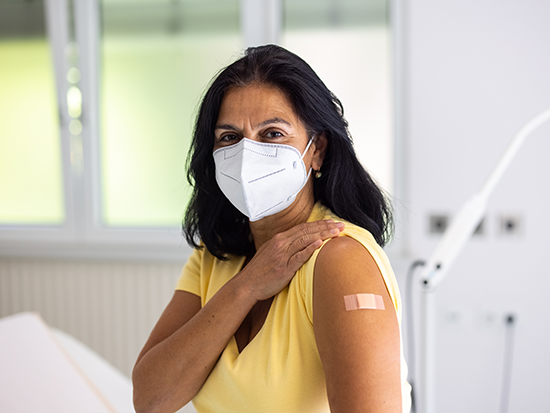Tackling Root Causes: Screening and Addressing Non-Medical Drivers of Health


UAB experts discuss vaccines that adults need to protect themselves and others.
 UAB experts discuss vaccines that adults need to protect themselves and others.Protection from some childhood vaccines can wear off over time, which is why experts from the University of Alabama at Birmingham Marnix E. Heersink School of Medicine recommend adults stay on top of their immunizations to help prevent themselves from getting and spreading serious diseases.
UAB experts discuss vaccines that adults need to protect themselves and others.Protection from some childhood vaccines can wear off over time, which is why experts from the University of Alabama at Birmingham Marnix E. Heersink School of Medicine recommend adults stay on top of their immunizations to help prevent themselves from getting and spreading serious diseases.
"Vaccines are one of the most convenient and safest preventive care measures available," said Sumayah Abed, M.D., assistant professor in the UAB Department of Family and Community Medicine and family medicine physician at UAB Medicine Hoover Primary and Specialty Care. "Since immunity gained from vaccines can wear off over time, booster doses are necessary for adults to simulate the immune system during adulthood. In addition to boosters, there are also other vaccines adults need to get as they age to help protect themselves and others from infectious diseases."
The Centers for Disease Control and Prevention recommends vaccines for adults based on their age, prior vaccinations, health, lifestyle, occupation, travel destinations and sexual activity; but everyone's needs may be different based on these factors.
"Vaccines are safe and effective," Abed said. "However, depending on the type of vaccine and health conditions of the recipients, some vaccines may not be recommended for everyone. That is why it is important to speak with your health care provider about your specific needs to determine the best vaccines for you."
 Sumayah Abed, M.D., assistant professor in the UAB Department of Family and Community Medicine and family medicine physician at UAB Medicine Hoover Primary and Specialty Care.
Sumayah Abed, M.D., assistant professor in the UAB Department of Family and Community Medicine and family medicine physician at UAB Medicine Hoover Primary and Specialty Care.
(Photography: Nik Layman)The CDC recommends that everyone age 6 months or older get an annual flu vaccine. The flu vaccine helps the immune system recognize and fight off the flu virus, which minimizes or prevents the effects of the virus.
The ideal time to get a flu shot is in September or early October. Peak flu season is from December to February, and it takes a minimum of two weeks for antibodies against the flu to develop fully following vaccination. She also cautions against getting the shot too soon as the preventive effect will wear off over the subsequent months and flu can linger into spring.
All currently approved or authorized COVID-19 vaccines are safe and effective and reduce the risk of severe illness. Vaccination can reduce the spread of COVID-19, which helps protect those who get vaccinated and the people around them.
For the best protection, the CDC recommends everyone 6 months or older stay up to date with their COVID-19 vaccines, which includes getting boosters if eligible. People who are pregnant, may become pregnant or are breastfeeding should also get vaccinated against COVID-19 to help protect themselves and their babies.
"Pregnant women are more liable for severe illness if they get COVID-19," Abed said. "Evidence suggests that the immunity pregnant women get from the vaccine can cross to their babies through the placenta and give them protection in the first six months of life."
The Tdap vaccine is typically given to children at 11 or 12 years old, but a Tdap booster is recommended every 10 years. If an individual has never had a Tdap vaccine, it is recommended that they get one as soon as possible. For pregnant people, a Tdap vaccine is needed during each pregnancy, specifically during the 27th through 36th weeks of pregnancy.
This vaccine protects people from tetanus, sometimes known as "lockjaw," an infection that is caused when bacteria enter the body typically through breaks in the skin and produce a toxin that leads to painful muscle tightening and stiffness. In severe cases, it can lead to trouble breathing, seizures and death. Diphtheria is a highly contagious, infectious disease caused by bacteria that can lead to tissue development in the throat, which can result in difficulty swallowing and breathing. Pertussis is known as "whooping cough" and can cause uncontrollable, violent coughing, which often makes it hard to breathe.
"Whooping cough is a very dangerous disease, especially for infants," Abed said. "That is why we encourage women to get a Tdap vaccine while they are pregnant or immediately after giving birth to help protect themselves and their infant. Caregivers who will be around the baby and have not already had a whooping cough booster shot should also get vaccinated."
Adults age 65 or older should get both pneumococcal vaccines to help protect themselves from pneumococcal disease that causes infections, such as pneumonia, meningitis and bloodstream infections. Doctors consider some of these infections caused by this disease "invasive," meaning that germs invade parts of the body that are normally free from germs. When this happens, disease is usually very severe, requiring hospital care and even causing death in some cases.
People between the ages of 19 and 64 years who are immunocompromised or have certain long-term conditions may have to get the shot earlier. Individuals should talk with their health care provider to determine when they should get this vaccine.
 Isabel Scarinci, Ph.D., professor in the UAB Department of Obstetrics and Gynecology and senior adviser for Globalization and Cancer at the UAB O'Neal Comprehensive Cancer Center.
Isabel Scarinci, Ph.D., professor in the UAB Department of Obstetrics and Gynecology and senior adviser for Globalization and Cancer at the UAB O'Neal Comprehensive Cancer Center.
(Photography: Steve Wood)The CDC recommends children age 11 or 12 receive the HPV vaccine, but children can get it as young as 9 years old. However, the vaccine is recommended for everyone through age 26. Teens and young adults who begin the vaccine series later in life, at ages 15 through 26, should receive three doses of the vaccine.
"While we encourage parents to protect their children from HPV-related cancers by vaccinating them before they are exposed to the HPV virus, there is enough evidence showing that young adults can benefit from HPV vaccination," said Isabel Scarinci, Ph.D., professor in the UAB Department of Obstetrics and Gynecology and senior adviser for Globalization and Cancer at the O'Neal Comprehensive Cancer Center at UAB.
HPV vaccination is not recommended for everyone older than age 26 years, but some high-risk groups age 27 through 45 years who were not already vaccinated might choose to get the HPV vaccine after speaking with their doctor about their risk for new HPV infections.
HPV vaccines protect against infection of HPV-related cancers, including cancers of the back of the throat (including the base of the tongue and tonsils) and anal cancer among men and women, as well as cervical, vaginal and vulvar cancer among women and penile cancer among men. This vaccine can also prevent genital warts.
Shingles is a painful rash that develops on one side of the face or body. The rash consists of blisters that typically scab over in seven to 10 days and fully clears up within two to four weeks.
To prevent shingles, adults 50 years or older should get two doses of Shingrix, the shingles vaccine, separated by two to six months. Adults 19 years or older who have or will have weakened immune systems because of disease or therapy should also get two doses. If needed, people with weakened immune systems can get the second dose one to two months after the first.
There is no maximum age for getting this vaccine. For those who have had shingles in the past, this vaccine can help prevent future occurrences of the disease. Although there is no specific length of time that one needs to wait after having shingles before they can receive Shingrix, they should make sure the shingles rash has gone away before getting vaccinated.
In addition to the vaccines listed above, Abed reminds people that other vaccines recommended for adults include Meningococcal, Hepatitis A and Hepatitis B. For a full list of vaccines for adults, visit cdc.gov.
To better understand vaccines that each individual needs, they should look to their personal vaccination records.
"It is important to keep personal vaccination records saved for travel, work and school registration," Abed said. "The best way to discover your immunization status is to ask your primary care physician. Most health providers have access to Alabama's immunization registry and can locate your record. Other ways include asking parents and checking with previous schools, employers or pharmacies that usually keep vaccination records in their system."
Comments
Post a Comment